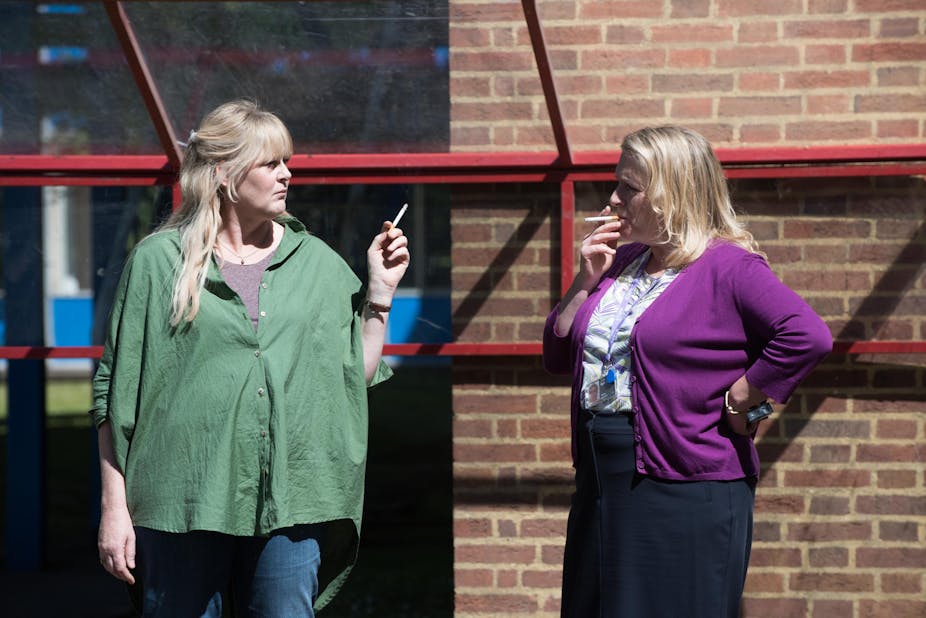A child dies. A nation mourns. The professionals gather to ask how and why. The media and the public want answers, then justice. It’s sadly an all too familiar process.
With Channel 4’s new TV drama Kiri, the British public peek into the world of the social worker at the centre of a horrific scandal. The show is about a social worker called Miriam, played by Sarah Lancashire, and her actions around the disappearance of a child called Kiri.
Sadly, the first episode bombarded the viewer with a litany of potentially damaging images of social work. Miriam is seen adding alcohol to her morning coffee, sporadically drinking from a hipflask throughout the day, gossiping with colleagues, drink driving, and engaging in an inappropriate friendship with an ex-service user. Social workers on Twitter were less than impressed.
What appeared to frustrate social work viewers most, though, was Miriam’s dog in the office. Perhaps a trivial point, but one which seems emblematic of how easily a portrayal can go astray.
Exploited for TV drama
Social work, though a relatively burgeoning profession after it became a protected title as recently as 2005, appeared on TV screens as early as the 1960s. But portrayals, such as East Side/West Side in 1963-4, depicted the profession as bureaucratic and inefficient. In 2016, after the BBC soap opera EastEnders portrayed an emotive scene in which a child is removed from the care of its mother, social workers took to Twitter to express their disappointment at the missed opportunity to represent child protection effectively.
Despite the criticism, EastEnders writers leaned on the profession again to progress their plot, this time when one character had two children removed from her care following anonymous reports of bruising.
Positive representations of social work do exist – such as the true story turned 1980s film Oranges and Sunshine – but they are seemingly few and far between.
The writer of Kiri, Jack Thorne, said he was inspired to “examine the pressures (social workers) are put under” after watching his mother work in the caring professions. It was a similar story for comedian Jo Brand, co-writer of Damned, a Channel 4 comedy set in the offices of a fictional local authority. Brand said she was hoping to make social workers “seem like real people” and to dispel the stereotypes.
My own ongoing research hopes to uncover whether social workers feel that Damned, and other shows like it, are successful in achieving positive or accurate representations.
Impact on the profession
Poor representation and portrayal of the profession has been associated with lower salaries, and poor recruitment and retention – so it is no wonder that social workers have had enough. A 2009 Social Work Taskforce report described how a “culture of defensiveness … serves only to exacerbate media frenzy”, and the public image of the profession is “unremittingly negative”.
Despite some of the negative character flaws we see in Miriam during Kiri, she is represented as a fully imagined and complex person, struggling on. She is seen caring for her mean and racist mother, as well as her sick dog, and juggling a number of complex cases.
With her alcoholic tendencies and inappropriate behaviour, Miriam might not be the best portrayal of the profession, but her character bucks the trend of “child snatcher” or “child catcher”, for which social workers had become, almost exclusively synonymous with.
Kiri is being aired less than a year after the government’s new Children and Social Work Act gained royal assent in April 2017. The changes brought about by the law include a new regulatory body for social work, as well as a restructuring of national child safeguarding in England. Some of this has been criticised, but there is still hope that a new regulator, to be named Social Work England, could be just what the profession needs to help boost public confidence.
Social work arguably offers a great wealth of stories for writers to weave the complex and dramatic stores of 21st-century Britain. But the depth of complexity that is the reality for social work practice is not in keeping with the momentum of an engaging drama. The pace and drama demanded by modern television has been described by some researchers as at odds with realistic or positive portrayals of social work.
However, in shows such as Channel 4’s 999: What’s your Emergency, complex issues of the emergency services are made palatable for viewing, giving an insight into what it’s like to work in such contexts. This style and genre of reality television documentary offers the opportunity for social work to be explored on screen without reliance on the stereotypes that can be deleterious to the profession. The problem with stereotypes is not that they are necessarily untrue, but they are incomplete. And social work needs and deserves complete stories.

